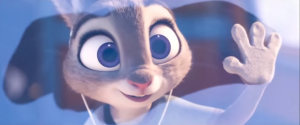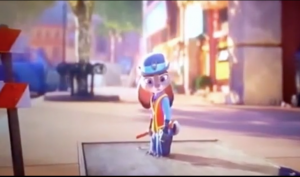
In spite of her mighty kick towards knocking down pre-established gender roles in a patriarchal society, Fa Mulan ultimately winds up and misses, landing right back where she started. The modern retelling of an old Chinese folktale dating back to the Northern Dynasty (Brocklebank 277), Disney’s animated movie Mulan depicts the titular character in her efforts to break free of societal roles and expectations by fighting in her injury-plagued father’s place against the invading Huns. Familial honor is a highly held virtue in Chinese society, which incites Mulan to represent her ancestors despite knowing that impersonation of a soldier is an act of treason punishable by death. Mulan was widely marketed towards its audience as a movie that shows men and women have equal possibilities of being heroic. The New York Times review claims, “Disney takes a sledgehammer to the subject of gender stereotyping in ‘Mulan’, a film that not only breaks the cross-dressing barrier but also ratchets up the violence level for children’s animation” (Maslin). Unfortunately its efforts were flawed.
Mulan perpetuates male dominance in gender binaries despite its (unsaid) promise that identity does in fact move beyond gender. Males are still held in a superior position in respect to females. Even a movie that is marketed as a heroine’s journey towards gaining acceptance by breaking inhibitory societal expectations, it fails in delegitimizing the gender binary because “male” actions- swinging a sword, providing protection for your country, being a strong soldier- are all done when characters are portrayed aesthetically male. The perpetuation is subtle, created by certain cinematic choices made by the director, editor, producer, and other high position roles in the movie-production hierarchy. In her essay, “Visual Pleasure and Narrative Cinema”, Laura Mulvey convincingly describes certain cinematic codes that creates the voyeuristic gaze of a woman (Mulvey 403). We see a female only through her relation to a male. In Mulan, both certain songs (with their extremely masculinized titles and lyrics) and the subtleties in facial distinctions between genders sustain this gaze, maintaining the repressive gender stereotypes. The hidden message is Mulan can only do what she does under the guise of a man. She isn’t a true heroine, but a masculinized female hero who learns how to spit and punch like a man in order to make an impact. Despite its promise, women are not empowered in the movie. Its reality is that women have to be masculinized in order to feel and be seen as empowered.
In Mulan’s society, the differences between honorable actions done by either gender are polar opposites. Men bring honor to their family by being a soldier while women do so by marrying a man with high social status. Simply put, honor comes when men are active and when women are passive. Indeed, Mulan brings honor to her family, but does so in an atypical way. Sparked by her decision to join the army, she breaks through stereotypes and brings honor by “being manly”.
The facial differences between Ping (her male counterpart) and Mulan is astonishing. Carol Clover states, “the perceived nature of the function generates the characters that will represent it” (Clover 13). The facial characteristics that the movie displays for Ping/Mulan sustain the notion that gender is defined by predetermined functional roles. Although Mulan can be “manly”, she actually has be a man in order to do so. The aesthetic representation of certain actions and/or decisions will influence the movie’s character depiction of choice; Mulan will attempt to be “womanly”, while Ping does “manly” things. Disney’s motive is that since Mulan cannot conform to gender stereotypes, she should be displayed as a man who will be accepted in society. Disney can spin a message about being progressive but is unconsciously maintaining conservative mindsets regarding the strength of gender through its aesthetic depictions being explicitly paired with the said characters actions.
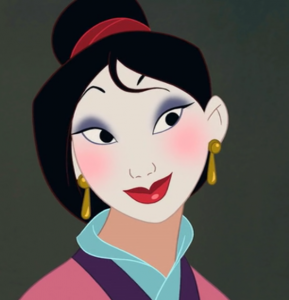
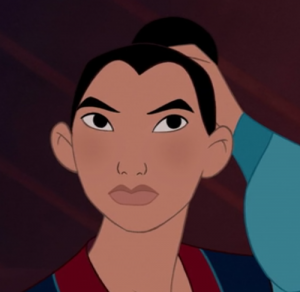
“Sex proceeds from gender, not the other way around” (Clover 13). The subject of breaking gender stereotyping does not happen because females adhere to feminine actions (like when the women are lining up to be presented to the matchmaker), and vice versa. And the females that are characteristically “un-female”, such as the matchmaker- who is extremely dominant, assertive, and commanding, unlike most women- appears man-like. She has a beard.
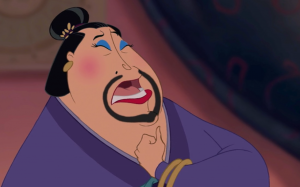
In Mulan, identity comes from gender. Disney’s hopes backfired because the characters specifically look their part, undermining the message regarding equal potential for being heroic in regards to gender. In the scene when Mulan describes the qualities of a women as, “quiet and demure, graceful and polite, delicate, refined, poised- punctual… something a ‘proper’ young woman should possess” (Davis 195), her feminine characteristics are extremely prominent. She has long slender fingers, an angular face, a thin waist, and narrow, slanted eyes. Pairing demeaning female characteristics with a brushed up and glossed over version of a female does not exactly sell the message that women can be empowered. Rather, it sets the tone that women are trying to assimilate themselves into a society which does not have any functional use for them, changing their outward appearance to feel more accepted. They are stand-ins and fillers that occupy space but offer little of their own.
Now compare these aesthetics to Ping, a more manly and buff version of Mulan. The perceived appearance of Ping generates his function. He has a rounder and stronger jawline, rounder eyes, and has significantly more mass than Mulan. Thus, he appears in the scenes when the security and wellbeing of China is being protected: becoming the top soldier in Shang’s class and single-handedly destroying the majority of the Hun army. He can do those things because he is a man, further corroborating that purpose is directly correlated with appearance.
For the majority of the movie, success and failure are inextricably linked to aesthetic appearance. The song “I’ll Make a Man Out of You” is extremely misogynistic, not only in the message it sends with its masculinized title, but the way it portrays Mulan/Ping. When Mulan fails and helplessly embarrasses herself towards the start of her training, she appears more womanly. Shang sings, “Did they send me daughters/When I asked for sons?” Her muscle structure is not defined and her shoulders droop from the apparent burdens of struggling to prove herself. A woman cannot handle the strenuous tasks of a male soldier. But after overcoming obstacles and finally proving himself, Ping’s ferocity and manliness takes over. His arms and body appear noticeably bigger, and his clenched fist displays his readiness to fight anyone who proves a challenge for him. A character’s function thus comes after his gender has been portrayed, not the other way around. Gender stereotypes are affirmed rather than being challenged.
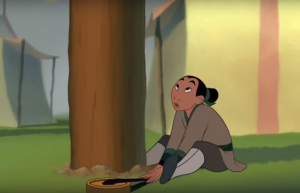
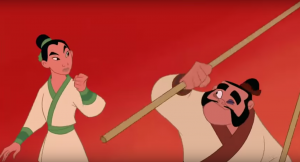
Lisa Brocklebank deals with issues of decreased femininity of Mulan in her essay, “Disney’s ‘Mulan’—the ‘True’ Deconstructed Heroine?” She delves deeper into the ideological constructs of gender stereotypes that may or may not affect Mulan. She describes that Mulan/Ping can, “coexist harmoniously, without sacrificing one aspect to the other… Mulan is neither one thing nor the other, but everything at once. Mulan manages to construct a tale which succeeds not only in inverting but also in escaping altogether the scripted gender reality” (Brocklebank 277). Unfortunately this is not the case. Harmony cannot co-exist with repression, just as Mulan cannot exist co-harmoniously with Ping because her femininity initially has to be repressed to gain acceptance from other men. The very instance of repression undermines the possibility of identity harmony in regards to gender.
Mulan also reaffirms gender stereotypes because she only temporarily escapes the “scripted gender reality”. She defeats Shan-Yu while being aesthetically portrayed in the movie as an extremely talented swordswoman. But this representation does not persist through the movie’s entirety. Disney does not maintain the notion of a strong woman who subserves the breaking of stereotypes. Instead, future marriage is implied when Mulan and Shang both end up at her home. Her journey, starting from an uncomfortable woman who could not conform, to a soldier who was successful regardless of gender, brings her directly back to where she started. Disney’s experimentation with gender in relation to societal success falls back on stereotypes in the end. Contrary to popular belief, it should be deemed as a failure.
Works Cited:
Brocklebank, Lisa. “Disney’s ‘Mulan’—the ‘True’ Deconstructed Heroine?”. Marvels & Tales 14.2 (2000): 268–283. Web. 16 May 2016.
Clover, Carol. “Carrie and the Boys”. Men, Women, and Chainsaws: Gender in the Modern Horror Film. Princeton: Princeton University Press, 1992. 3-20. Print.
Davis, M. Amy. “Disney Films 1989—2005: The ‘Eisner” Era’.Good Girls and Wicked Witches: Changing Representations of Women in Disney’s Feature Animation, 1937-2001. Indiana University Press, 2011. 169–220. Web. 17 May 2016.
Maslin, Janet. “Film Review: A Warrior, She Takes on Huns and Stereotypes”. The New York Times 19 June 1998. Web. 17 May 2016.
Mulan. Dir. Barry Cook and Tony Bancroft. Buena Vista Pictures, 1998. Netflix. Web. 15 May 2016.
“Mulan- I’ll Make A Man Out of You (FULL HD)”. Youtube. Web. 18 May 2016.
Mulvey, Laura. “Visual Pleasure and Narrative Cinema”. Media and Cultural Studies: Keyworks. Ed. Meenakshi Gigi Durham and Douglas M. Kellner. Oxford: Blackwell, 2001. 393-404. Print.

